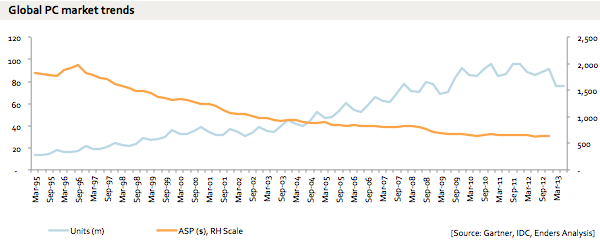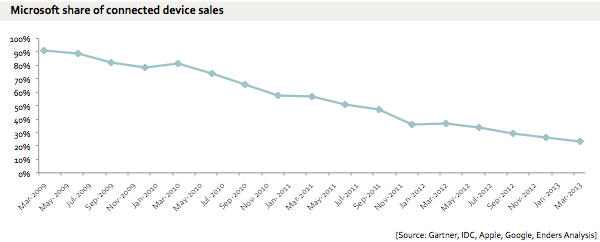The irrelevance of Microsoft
Quarterly numbers are all well and good, but sometimes it takes a really long-term chart to see what's going on. This one shows unit sales and average selling prices of PCs (including Macs, not that it matters) since 1995, the year Microsoft sealed its victory with Windows 95.
This is really a classic illustration of the demand curve; falling prices and rapid growth in unit volumes, mainly driven by the growth of the PC internet. And, of course, the dip downwards in the last few quarters. The contrast with the exploding sales of the new wave of mobile UNIX devices is pretty obvious.
The practical effect of this is that Microsoft's share of connected devices sales (in effect, PCs plus iOS and Android) has collapsed from over 90% in 2009 to under a quarter today.
Just as overnight success can take a lifetime, so overnight collapse can also take a long time. There are founders creating companies today who weren't born when people were still actually scared of big bad 'Micro$oft'. It stopped setting the agenda 18 years ago. Windows 95 was the moment of victory, but was also the peak: it came just at the moment that the Internet started taking off, and Microsoft was never a relevant force on the internet despite investing tens of billions of dollars.
But you needed a PC to use the internet, and for almost everyone that PC ran Windows, so Microsoft's failure to create successful online services didn't seem to matter. Microsoft survived and thrived in the PC internet era, despite appearing to be irrelevant, by milking its victory in the previous phase of the technology industry. PC sales were 59m units in 1995 and rose to over 350m in 2012. Of course, that's now coming to an end.
Though it looks like we've passed the tipping point, this process isn't going to be over quickly. PC sales aren't going to zero this year. But the replacement cycle, already at 5 years, will lengthen further and further, more and more apps will move to mobile or the cloud, and for many people the PC will end up like the printer or fax - vestigial reminders of an older way of doing things. Microsoft may yet manage to turn Windows tablets and phones into products with meaningful market share, but it will never be dominant again.
Note
A few commentators seem to think I'm ignoring (or just don't know about) Microsoft's enterprise and games businesses. That isn't the point. Those are perfectly good businesses, but they don't set the agenda. They don't drive the future of the consumer technology world. No-one's afraid of them.


